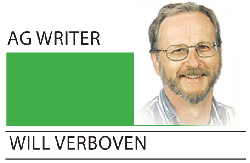Federal Liberals elected a new leader they believe will save them from political obliteration in the next election. According to recent polling trends, they may survive with fickle NDP voters’ support. It won’t be with much support from ag industry and rural voters who traditionally favour Conservative parties. That reality has seen decades of neglect of agriculture by successive Liberal governments, except for their zealous fanatical support of supply management (SM). The past Trudeau government worsened that neglect by turning Ag Canada into a tool to promote climate change ideology – well away from its original mandate of research and industry development. The list of mindless climate change-related grants, contests, and other schemes wasted millions of dollars that could have been used to promote actual ag research. It reached heights of absurdity when grant applications had to have a 30% climate change component, along with connections to DEI goals. Add into that bilingualism requirements and regional political parity, and it’s no wonder that consulting companies grew rich creating intensely politically correct applications for federal grants. But I digress.
There was probably no expectation that agriculture issues were going to be mentioned in a Liberal Party leadership campaign. Although one of the candidates made a dutiful appearance in front of some Quebec dairy cows declaring unwavering support for SM. It does cause one to wonder if the word “agriculture” ever passed the lips of Mark Carney. Would he know the difference between a doorknob and a Hereford. I jest, but I expect I am painfully close to the truth. To be fair, he is probably unaware of many issues facing other sectors of the economy, but ignorance of agriculture is usually much more prevalent among federal Liberal government politicians. The fear is that if Mr. Carney wins the next election, the regressive climate change policy that so permeates Agriculture Canada will just continue as senior department bureaucrats who guided that devious ideological policy will feel reassured and emboldened.
Prime Minster Carney has reduced but not eliminated the hated carbon tax to 0% because it became such a politically charged issue. Carbon taxes have received Mr Carney’s unequivocal support for many years in his global environmentalist efforts to save the planet. One suspects that it’s difficult to teach an old dog new tricks. Reducing the tax from being in the face of the voter is probably as far as climate change warrior Carney is willing to go. You can expect a newly elected, emboldened and politically duplicitous federal Liberal government will try to find every possible way to install a hidden shadow carbon tax. Expect new and increased taxes on energy companies’ emissions, refiners, pipelines, etc. New taxes on nitrogen fertilizer are a sure bet. Methane taxes on cattle will be unleashed (supply-managed dairy cows will be exempted). Loathsome Liberal Minister Guilbeault will continue his evil crusade against Alberta no matter what portfolio he is in.
Folks who produce SM commodities will probably feel a sigh of relief if a Prime Minister Carney government is elected in the upcoming election. Unfaltering loyal devotion to SM is the one ag policy that is central to Liberal ideology. Few would know that federal Liberal governments created national SM in the ‘60s and ‘70s. To be fair, every major federal and provincial political party and every provincial government supports SM. The degree of support goes from the zealous for Liberals and NDP to passive for conservative-leaning parties and governments. The killer hornet annoying the supply management honey pot is President Trump, who, in his mercurial way, is making Canadian dairy tariffs a major trade target. I have little sympathy for the dairy lobby in this situation; in many ways, they created the present dairy trade dispute with their incessant opposition to genuine reform of dairy supply management policy over the past 50 years. You reap what you sow is so true in this situation.
It’s an old saw horse of mine, but wilfully restricting least cost, large-scale milk production in Alberta through national quotas to preserve 8,000 small-time Quebec producers has made Canadian milk production uncompetitive against American imports. Ironically, it may be President Trump who may finally break the nefarious control of the Canadian dairy industry by the Quebec-controlled dairy lobby. I suspect a Carney government will dutifully try to die on the dairy supply management hill – but will, in the end, surrender to Trump triumphalism. The demise of SM will be good for Alberta.
Will Verboven is an ag opinion writer and policy advisor.









